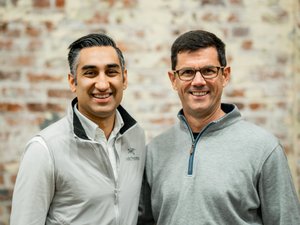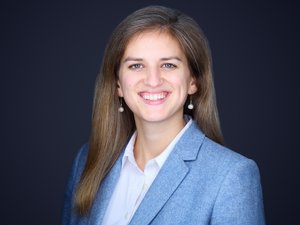
In his senior year of college at NC State, Ben Knosby was nominated by friends to plan their group snowboarding trip out west. An inexperienced traveler at the time, he had no idea how to pull everything together. So, he did what most of us do and searched online endlessly for the best rates. Just at the brink of giving up, he found a package deal with airfare, lodging, and lift tickets for himself and his 10 friends and clicked to book.
For his efforts and savvy Googling, Knosby received a rebate equaling about $500. He parlayed that savings to treat the group to dinner one night after the slopes.
That experience — along with Knosby’s minor in entrepreneurship and the many hours he had spent throughout his college career helping companies with sales and marketing — got him thinking: Could he sell that package to someone else? With that, a plan was set in motion to develop what would become Lucid Travel, a travel tech company that facilitates bookings for college sports teams with the lowest rates and generous cash-back incentive for team fundraising.
Knosby graduated from NC State in 2015 with a chemical engineering degree and started a career at Merck Pharmaceuticals in a rotational leadership program, but that didn’t stop him from fleshing out his idea. In his spare time, he learned front-end coding and built a web page offering unique spring break packages, which he promoted to college students who, like him, found themselves organizing their group trips. He sold that initial online travel package to 2 or 3 groups of spring breakers and continued to grow his customer base as he added new destinations and packages.
When he reached about $10,000 in profits, Knosby felt confident that it was time to create a solid business model. In August 2017, after two years with Merck, he left his corporate job and the security of a steady salary and officially launched Lucid Travel.
It wasn’t without help. Knosby knew that he needed to engage active mentors, and the first was his former entrepreneurship professor at NC State. Their discussions led to Knosby’s realization that spring breakers are really only one-time customers and that, in order to grow the customer base, he would need to rely heavily on marketing. So, Knosby had to think of a more sustainable model that allowed him to acquire customers and, more importantly, keep them.
His past experience led him to club sports teams at universities and colleges in the U.S. These teams typically have average-sized travel spends of about $50,000, but since they are not regulated by the NCAA or NAIA like the college or university teams themselves, their procurement processes and compliance requirements are not as rigorous. It’s a relatively big yet underserved market, and one that relies heavily on fundraising to offset travel costs, uniforms and other expenses.
“We began with a 100-person survey to this new audience and asked a simple question, ‘How do you schedule your travel now?’ That’s all we wanted to know,” Knosby said.
The answer was as suspected: The organizer searches and searches through Google and books on the lowest rate of all the results that appear. He understood that if they were going to make a model out of this and gain customers, they would need to both simplify the process and add an incentive.
Knosby began looking for travel partnerships, and after working his way through various contacts in Priceline.com’s complex organization, he managed to secure an arrangement — something rather unusual for a company of Lucid Travel’s revenue size. “They took a chance on us,” Knosby acknowledges.
But getting that contract was a lot of work, and he knew that continuing down the road of individual contracting would be costly and take too much time for the bootstrapped company. Instead, Lucid Travel sought one relationship with Lexyl Technologies, a company that already had direct contracts with the online travel booking sites such as Expedia, Booking.com and HotelPlanner. Once again, Knosby found himself diligently navigating another complex organization and facing opposition at many levels. But he ultimately made it through to the co-founder of Lexyl, who, at one time, had been in Knosby’s shoes. Because the co-founder liked Knosby’s style, what he was doing, and felt the model could work, he not only agreed to the arrangement, but became a valued mentor to Knosby.
Travel websites, hotel chains and airlines pay marketplaces to help facilitate their bookings. In this model, Lucid Travel pulls in all of the rates from top travel sites through Lexyl’s technology, and their customers get the lowest rates possible. Lexyl takes a portion of that commission and Lucid Travel shares a percent of their portion back with their customers — up to 7 percent. Lucid Travel builds a team page for each of its customers, which they can share with their families, friends and fans to maximize rewards. The teams use the cash back as a fundraising stream to offset the cost of travel, uniforms and other expenses.
This month, Lucid Travel celebrates its one-year anniversary and its success in contracting over 60 college club sports partnerships with 2,000 individual teams. But this is just the beginning of Knosby’s go-to-market plan.
“One of the biggest hurdles in starting this business has been attracting our first customers. They’re the hardest to get because everyone wants to know who you’re working with,” Knosby said.
Starting with club sports allowed Lucid Travel to prove itself in the market and build an impressive portfolio. Now, the company has data and can show how much money it’s helped the club sports team save and earn. With a story to tell, Lucid Travel is now approaching universities directly to secure contracts with their teams — some of which have travel budgets in the tens of millions. And Knosby’s patient approach is working. Lucid Travel is currently in talks with five universities, and if all goes well, it could see revenue nearing $4 million in 2018.
As a startup founder, Knosby notes the importance of engaging active mentors who have been vital in helping him avoid mistakes, and with his recent move with his wife back to the Charlotte area where they grew up, he hopes that he can be a mentor to others.
“I follow the startup scene closely and see that things are budding here in Charlotte. I want to have a role in this and, even though I’m young, I think I can be an integral part of the startup ecosystem,” Knosby says.
Knosby also offered advice to other founders who opt to bootstrap: Lucid Travel keeps costs down by leveraging and coaching interns for outbound sales, and contracting 1099 employees with highly specialized skills such as back-end coding, customer service and marketing, rather than hiring employees with high salaries.
“We’ve had no outside money and no loans, which has been really cool so far. But, being bootstrapped you have to do everything,” Knosby adds, “You may have 100 things on your task list, but you can only do 10 of them today. You have to be very strategic about what you do each and every day and focus on what’s most important.”
For more stories like this, subscribe to StartCharlotte’s free weekly startup newsletter.








